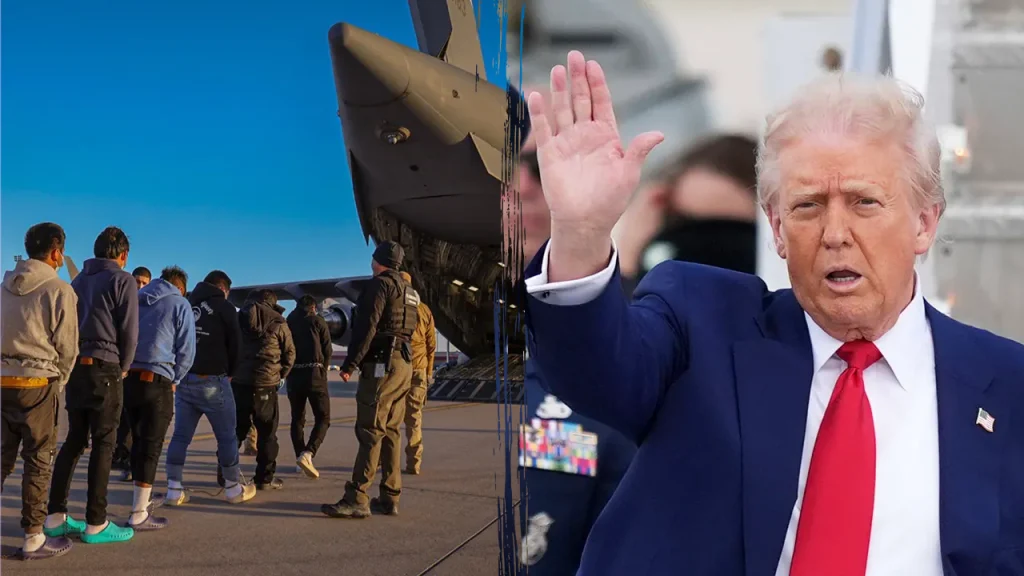Trump Administration’s Deportation Efforts: A New Era in Immigration Enforcement
In a sweeping transformation of U.S. immigration policy, the Trump administration has overseen the removal of over 515,000 illegal immigrants since January 2024, putting it on track to exceed historical deportation records. According to Tricia McLaughlin, Assistant Secretary at the Department of Homeland Security (DHS), the administration is poised to reach 600,000 deportations by the end of President Trump’s first year back in office. This aggressive enforcement approach represents a stark departure from previous policies, with McLaughlin characterizing the effort as “jumpstarting an agency that was vilified and barred from doing its job for the last four years.” Beyond formal deportations, the administration reports that an additional 1.6 million individuals have self-deported, bringing the total number of departures to over two million. Meanwhile, DHS has arrested approximately 485,000 illegal immigrants in this same period, highlighting the multi-faceted approach to immigration enforcement under the current administration.
The impact of these policies extends beyond U.S. borders, with McLaughlin noting dramatic changes in migration patterns. “Illegal aliens are hearing our message to leave now or face the consequence. Migrants are now even turning back before they reach our borders,” she stated. As evidence of this deterrent effect, the administration points to what it describes as a 99.99 percent reduction in migration through Panama’s Darien Gap, a critical route for those traveling to the United States. This remarkable decrease suggests that potential migrants are reconsidering their journeys in response to the administration’s hardline stance. Despite facing what McLaughlin describes as “a historic number of injunctions from activist judges,” the various agencies involved—Immigration and Customs Enforcement (ICE), Customs and Border Protection (CBP), and the U.S. Coast Guard—have continued their enforcement operations with notable determination.
Even amid a government shutdown, DHS has maintained its focus on apprehending what it terms the “worst of the worst” criminal illegal immigrants. Recent operations have resulted in the arrests of individuals convicted of serious offenses, including child rape, assault, hit-and-run, kidnapping, and various other crimes. The weekend arrests highlighted by DHS included Erick Xavier Romero, a Dominican national convicted of child rape in Boston; German Osvaldo Cortez-Chajon from Guatemala, convicted of traveling to meet a child for unlawful sexual activity in Alabama; and Graciano Lopez-Flores, a Mexican national convicted of indecent liberties with a child in North Carolina. These cases represent just a small fraction of the enforcement actions taking place across the country, but they exemplify the administration’s prioritization of removing individuals with criminal convictions.
Further arrests demonstrate the nationwide scope of these enforcement efforts. In North Carolina, authorities apprehended Shahed Hassan, a Bangladeshi national with multiple convictions including assault, weapons charges, and domestic violence violations. In Virginia, officers arrested Van Pham from Laos, who had been convicted of abduction and burglary. Massachusetts saw the arrest of Patricia Pimental-Cordero, a Dominican Republic national convicted of hit-and-run offenses, while in New Jersey, authorities detained Ramona Mercado-Vasquez from Dominica, who had kidnapping and robbery convictions. In Wisconsin, Mexican national Karlett Zagal-Salazar was arrested following a drug trafficking conviction. This geographic diversity highlights the administration’s commitment to nationwide enforcement rather than concentrating efforts in border states or major metropolitan areas.
The administration has framed these enforcement actions as essential to public safety, with McLaughlin asserting that “nothing—not even a government shutdown—will slow us down from making America safe again.” This messaging reflects the administration’s broader narrative that links immigration enforcement directly to national security and community safety. By highlighting cases involving violent or predatory crimes, DHS appears to be making a case to the American public that its enforcement priorities are aligned with legitimate public safety concerns. This approach represents a continuation of the rhetoric that characterized President Trump’s first term, when he frequently emphasized criminal activities by some illegal immigrants as justification for stricter border policies and interior enforcement.
The political dimensions of these enforcement efforts are impossible to ignore, particularly in the context of the ongoing government shutdown. McLaughlin directly criticized Democrats, stating, “While Democrats in Congress continue to keep the government shutdown, our ICE law enforcement officers aren’t slowing down in arresting the worst of the worst criminal illegal aliens.” This framing positions immigration enforcement as a critical government function that continues despite political disagreements over funding and broader policy objectives. It also highlights the deep partisan divides that continue to characterize immigration policy in the United States, with fundamental disagreements about priorities, methods, and the balance between enforcement and humanitarian considerations. As the administration continues its aggressive approach to deportations and arrests, these tensions are likely to persist, shaping both policy implementation and the broader political discourse around immigration in America.














